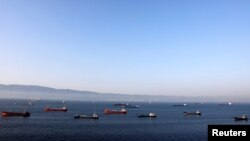One of the few companies monitoring global oil shipments says Iranian state-owned tankers have kept their transponders off for more than a week, in an apparent attempt to evade U.S. sanctions.
Speaking to VOA Persian from Stockholm, Sweden, Friday, TankerTrackers.com co-founder Samir Madani said National Iranian Tanker Company (NITC) vessels have remained “completely dark” since shutting off their Automatic Identification System (AIS) transponders in late October.
“AIS transponders being switched off has become the general modus operandi right now for NITC vessels within the Persian Gulf and Gulf of Oman areas,” Madani said. “That is of course a concern from a safety aspect.”
Transponders required
Under international maritime law, tankers have been required to use AIS transponders to broadcast their identity and location since 2004. The transponders are safety devices used for avoiding collisions.
In a State Department briefing Wednesday, U.S. Special Representative for Iran Brian Hook said there is credible data showing that “up to a dozen” Iranian tankers recently disabled their maritime transponders. “Turning them off only increases risk of accidents and injuries,” Hook said, adding that Iran also has used the practice in the past to evade sanctions.
Washington reimposed sanctions on Iran’s energy exports Monday after having lifted them as part of a 2015 nuclear deal between Iran and six world powers. U.S. President Donald Trump withdrew from the deal in May and said sanctions would be gradually re-instated to pressure Iran into ending perceived malign activities.
Madani said TankerTrackers has been relying entirely on satellite imagery to monitor movements of the Iranian tankers since they went dark. He said that at some point, those tankers will have to switch the AIS transponders back on.
“For instance, if the Iranians ever send tankers through the Suez Canal, they have to have the transponders on there,” he said, adding that tankers passing by Singapore en route to China also must have transponders turned on.
In a Thursday tweet, TankerTrackers said poor weather was obscuring the satellite imagery that it uses to monitor NITC vessels, but it hoped to locate them as soon as skies clear.
Loss of insurance
In his Wednesday briefing, Hook said Iranian tankers will become an even greater threat to navigation as they lose access to insurance on the international market and turn to domestic insurance. The sanctions re-imposed by the U.S. Monday also target the provision of insurance services to Iranian shipping companies.
Iran has said it will not be bullied by U.S. sanctions and will use its own resources and help from friendly nations to try to sustain its economy, which has struggled with high inflation and unemployment.
“Should there be an accident involving an Iranian tanker, there is simply no way Iranian insurance companies can cover the loss,” Hook said. “Self-insured Iranian tankers engaging in unsafe behavior with many tons of crude oil onboard is courting environmental and financial disaster. Our strong message to any entity considering doing business with these Iranian tankers is to rethink your decision.”
This article originated in VOA's Persian Service.




